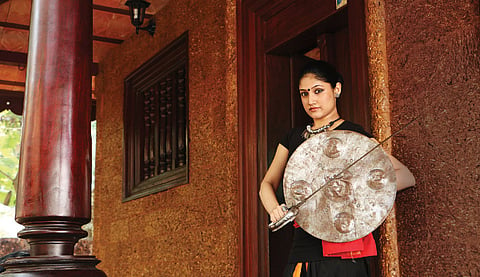

When Akhila Sasidharan enters the kalari (training hall), she goes to the south-west corner called the poothara and stands still, with folded hands, in front of an idol of the Goddess Bhagawati. Then, she begins making stretching movements with her arms and legs. This comprises the Kalarai Vandanam (prayer).
Thereafter, the training begins with the Surya Namaskar (Salutation to the Sun), followed by leg movements: circling of the leg, and moving it to the right or the left. Akhila performs the vadivukal (poses in the form of an elephant, lion, boar, cat, cock, snake, horse and fish). Then it is on to the meipayattu (a combination of leg and animal poses) and, finally, there is the weapons training, using swords, daggers, sticks and shields.
“The emphasis is mainly on body movements, rather than using weapons,” says Akhila, the only actress in Mollywood who is trained in the ancient art of Kalaripayattu.
“Like all other classical art forms, the ultimate goal is self-realisation. When you perform, you go deeper into yourself. It is a misconception that Kalaripayattu is only a method to attack the opponent. In fact, it is a means to defend oneself if one is attacked.”
Akhila, who grew up in Saudi Arabia, Oman and Bahrain, saw a Kalaripayattu performance during a visit to Dubai and became fascinated. A trained classical dancer, Akhila realised that a lot of movements in the classical arts originated from Kalaripayattu. “The basic moves of Kathakali come from Kalaripayattu,” she says. “Through the ages, people have taken from Kalaripayattu for different reasons. It is the source of all body movements.”
So, about five years ago, Akhila decided to become a student. It helped that she was staying in Kozhikode where the Hindustan Kalari Sangam is located.The more she practised, the more she felt she was changing. “I became aware of each body part,” says Akhila “I knew what my body was capable of. I also felt a connection with Mother Earth, especially when I performed on a mud surface.”
Akhila’s most thrilling moment occurred when she did a Kalaripayattu performance during the 100-year celebrations of Indian cinema in Chennai a few weeks ago. “Traditionally, a Kalaripayattu performance is not a choreographed show,” she says. “In fact, it is not set to music.”
But, as a novelty, Akhila choreographed the art form according to music done by composer Rahul Raj. She used movements and weapons sequences. “I avoided the conventional dance steps,” she says. After the show, she was complimented by Malayalam film notables like actor Jayaram, and directors Joshy, Kamal and Sibi Malayil. Local newspapers described her performance as ‘mesmerising’.
As adept as she is in the art form, she is also a successful actress. She acted with superstar Dileep in the hit film, Karyasthan, and with Prithviraj in Theja Bhai and Family. Earlier, she made her mark in a dance reality show on TV Vodafone Thakkadhimi, and was the anchor in the hit show, Munch Star Singer Junior.
“I started receiving film offers once Thakkadhimi was aired,” she says. Unlike most actresses, she is well-educated. She has a masters degree in English literature from Calicut University and is doing one in political science from the Indira Gandhi National Open University. The future looks bright for this young performer.
An Ancient art
Kalaripayattu or “Payattu” is an Indian martial art form. It is now practiced in Kerala, in parts of Tamil Nadu and among the Malayali community of Malaysia.
Kalaripayattu developed during the 9th century and was practiced by warrior clans of Kerala to defend the state and the king.
It includes strikes, kicks, grappling, preset forms, weaponry and healing methods.
It is claimed that learned warriors could disable or kill their opponents by merely touching the correct ‘marmam’ (vital point). This was taught only to the most level-headed persons to discourage misuse of the technique.